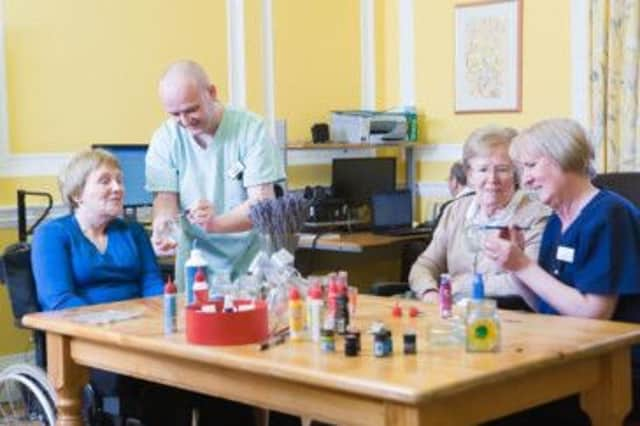Respite can make the world seem right


As the former chairman of the International Accounting Standards Board and the UK Accounting Standards Board, I have to admit that I’m a numbers man, but even I struggle to put a figure on quality of life. However, some of the facts and figures relating to people with long-term conditions and their carers add up to a growing problem, and we desperately need to find a solution.
There is an increasing number of people living with long-term conditions – recent figures from the Scottish Government estimate around two million people, or 40 per cent of the population, have at least one long-term condition – and they need support.
Advertisement
Hide AdAdvertisement
Hide AdThe Scottish Government says 60 per cent of all deaths are attributable to long-term conditions and they account for 80 per cent of all GP consultations. People with long-term conditions are twice as likely to be admitted to hospital, will stay in hospital disproportionately longer, and account for more than 60 per cent of hospital bed days used. With a hospital stay costing the NHS as much as £2,371 a week, surely we need to find a way to combat the strain being placed on an already overstretched health service.
Preventing bed blocking
One way of avoiding these statistics is to invest in the provision of quality respite care which will provide greater savings in the long run by reducing the burden of emergency hospital admissions and preventing bed blocking for unnecessary hospital stays.
It is impossible to overemphasise the need for respite breaks for people living with conditions such as multiple sclerosis, Parkinson’s, Huntington’s disease, motor neurone disease, stroke and spinal injury. As people are often diagnosed in their thirties and forties, the symptoms associated with these conditions are particularly cruel; they include loss of mobility, muscle weakness and spasms, swallowing difficulties and pain.
Because these people – and their families – lose so much in terms of independence and choice, it is vital that the respite breaks they are offered can help to redress the balance, with respect, dignity and choice given the same priority as nursing care.
At Leuchie House we see respite care as part of the wider picture and strive to enhance the lives of guests and their families who just need a break to help them cope. It’s a truly unique blend of health and social care that has a strong emphasis on social stimulation of guests, while providing 24-hour nursing care for their complex medical needs.
Leuchie House’s reputation as a model of excellence in respite care was recognised at a recent parliamentary reception to mark Leuchie Week, at which the health secretary, Alex Neil, said: “Without places like Leuchie House, we as a society would find it very difficult to look after people with long-term conditions.”
He added: “Getting that break is extremely important. Quality of life for people with long-term conditions must be a top priority for all of us.”
Importance of quality respite care
A regular guest at Leuchie, Mhairi McCran, told the reception that her breaks had been “the light at the end of a very dark tunnel”.
Advertisement
Hide AdAdvertisement
Hide AdThe importance of quality respite care extends to carers too. In Scotland, it is estimated there are more than 500,000 carers, with a further 500 people taking on a new caring role every day. It is estimated their role as carers saves the UK economy £10 billion every year.
Many have had to give up work to care for a family member and find their social interaction limited as a result. In Scotland alone, 45 per cent of carers said they were in debt as a result of caring.
Many spend more than 50 hours a week looking after their loved ones and 40 per cent have not had an overnight break in the past year.
There is, of course, a wider issue relating to reform of carers’ benefits, but in the immediate future we can avert a possible crisis by offering the Leuchie brand of expert nursing care in a non-clinical environment, giving people with long-term conditions the opportunity for a proper break – and at the same time giving their carers a proper break, either in one of the carers’ rooms at Leuchie House or freeing them up to do the things they do not have time for on a day-to-day basis.
None of this is a cost-free solution, of course, and we need to raise more than £1,000 every single day to continue to offer this level of care.
As a numbers man, I can see that the only way this is going to add up is if we all do our bit and I would ask you to consider making a donation by visiting www.leuchiehouse.org.uk, calling 01620 892864 or texting “LEUC13£5” to 70070.
• Sir David Tweedie is chairman of the board of trustees at Leuchie House www.leuchiehouse.org.uk